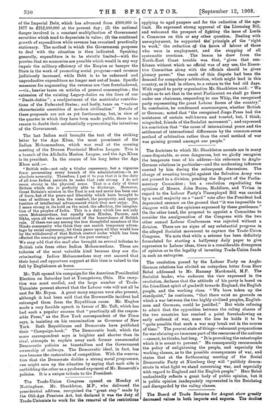The resolution passed by the Labour Party on Anglo. German
relations has elicited an outspoken letter from Herr Bebel addressed to Mr. Ramsay Macdonald, M.P. The Socialist leader, who endorses the view expressed in the resolution, declares that the attitude of his party is based on the friendliest spirit of goodwill towards England, the English people, and the working class. "We have taken up the standpoint," he continues, "that there exist no grounds on which a war between the two highly civilised peoples, English- men and Germans, could be justified." But while refusing to admit that the opposition between the ruling classes of the two countries has reached a point foreshadowing an early outbreak of war, none the less he holds it to be "quits possible that such a war may break out in the course of time." The present state of things—vehement preparations for war claiming an immense part of the resources of the nations
—cannot, he thinks, last long. "It is provoking the catastrophe which it is meant to prevent." He consequently recommends the policy of enlightening the people, and especially the
working classes, as to the possible consequences of war, and states that at the forthcoming meeting of the Social
Democratic Party at Nurnberg they will "publicly demon-
strate in what light we stand concerning war, and especially with regard to England and the English people." Herr Bebel undoubtedly reflects a great body of public opinion, but it is public opinion inadequately represented in the Reichstag and disregarded by the ruling classes.










































 Previous page
Previous page